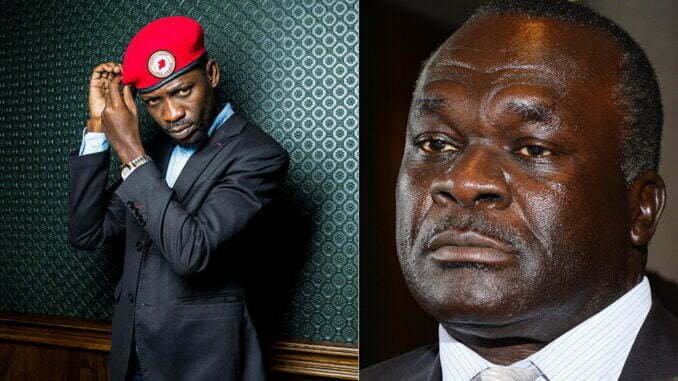
Kampala, Uganda | URN | Chief Justice Alfonse Owiny-Dollo has warned National Unity Platform [NUP] presidential candidate Robert Kyagulanyi aka Bobi Wine that he can’t intimidate or induce favours from the Supreme Court to rule in his favour by blackmailing the judges.
Mr Kyagulanyi petitioned the Supreme Court to have President Yoweri Museveni’s reelection annulled on grounds of violating various electoral laws including bribery, intimidation, vote-rigging, ballot stuffing, murders among others.
But on Tuesday 16th this week, Mr Kyagulanyi threatened to withdraw the case and take it to the public court, claiming the judges are biased towards him after they denied him the chance to file additional affidavits past the Sunday deadline.
He also said he wanted the chief justice together with two other judges; Mike Chibita and Ezekiel Muhanguzi off the case saying they have past and current relations to Museveni’s government.
Kyagulanyi said Owiny-Dollo has been a minister in Museveni’s government before and was one of his defense lawyers when he was sued in 2006 by Forum for Democratic Change (FDC) presidential candidate Kizza Besigye.
He further said Chibita worked as Museveni’s private secretary of legal affairs in the Office of the Presidency for 7 years while Muhanguzi, he said, is a close relative to Security minister Elly Tumwine who is a regime apologist.
On Friday 19th, February 2021, the Supreme Court sat again in Kololo to hear an application in which Kyagulanyi wants the court to admit over 150 affidavits which we rejected last week.
However, before the hearing of the application could start, Attorney General William Byaruhanga complained to the court about what he called the intimidation of the justices by Kyagulanyi.
“As the head of the bar, I would like to raise an issue concerning the conduct in this case. When we were here last time, we were guided and told that when a party gets grievances, they should bring them to court. What we are witnessing at this time is like a scheme to intimidate this court,” Byaruhanga said.
He added that he watched TV and read in newspaper reports where Kyagulanyi expressed his displeasure with the participation of some of the justice in his case.
“He [Kyagulanyi] called a press conference and said he didn’t have confidence that he was to get justice from the three justices. The litigant has a right to ask for recusal but not to do it through a press conference. He pleaded to a different gallery,” Byaruhanga said.
In response, Medard Lubega Sseggona who is the lead counsel for Kyagulanyi said he didn’t have any instructions for the said judges to recuse themselves.
“I agree that the matter in court should be in the hands of the court and that has been my practice for 18 years,” Sseggona said.
In reacting to the submission, Owiny-Dollo said whatever is circulating in the public will have no bearing on how the court will determine the case. He said as a judicial officer they swore an oath to serve justice to all people.
Justice Owiny-Dollo who spoke for nine minutes said that whatever Kyagulanyi says, he will not be able to intimidate the court to act in the way that he wants, to the merit of the case, he brought before them.
The chief justice added that if indeed Kyagulanyi wanted them out of his case, he should have written an application and asked them to recuse themselves instead of maligning them well knowing that they will not have an opportunity to respond.
Read Also: Bobi Wine lays evidence in 53 more affidavits to overturn Museveni’s win
Adding that the fact that he’s even applied to same court to accept more affidavits for the same case shows that he believes in the court and its ability to dispense justice.
“We are not opposed to fair criticism and the position we hold expects such criticism… Criticize my conduct, criticize my decisions, tear [them] to pieces but when you attack my person… when you know I don’t have the opportunity to stand up and respond to you…,” Chief Justice Owiny-Dollo said. He added that the judiciary will decide in the favour of any party that presents a good case.
“If indeed the petitioner chooses to take another path we can’t stop him from proceeding, you don’t need our permission you can proceed with your Plan B,” he added.



